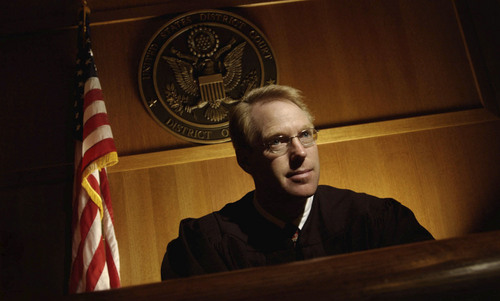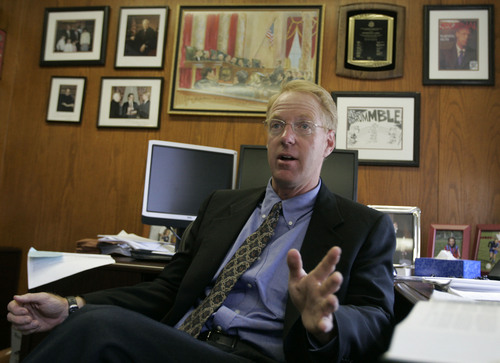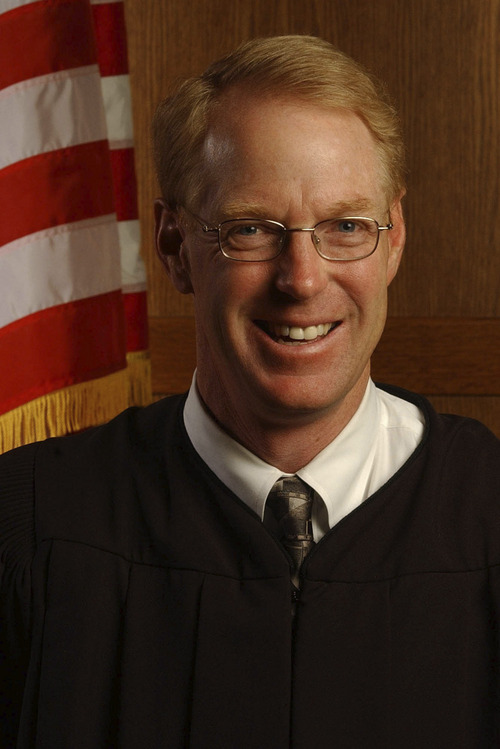This is an archived article that was published on sltrib.com in 2014, and information in the article may be outdated. It is provided only for personal research purposes and may not be reprinted.
Paul Cassell has advocated passionately in courtrooms across the country that every person who views or distributes an image of child pornography contributes to what victims have described as "death by a thousand cuts" and thus should be held liable for restitution.
On Wednesday, the University of Utah law professor will make that argument before what will be his most important audience yet: the U.S. Supreme Court. It is the first time a crime victim's attorney has appeared before the court in a criminal case filed by the government; the outcome may result in a historic decision for crime victims' rights.
Cassell's theory is straightforward: Every defendant convicted of child pornography should be held accountable for losses suffered by a victim, until the victim is fully compensated.
"We do need to begin expanding restitution for all kinds of crimes and [finding] ways to make victims whole after they've been victimized," Cassell said. "This is an important step along that way to make victims whole."
The case before the U.S. Supreme Court involves a Texas man who viewed images of an 8-year-old girl identified by the pseudonym "Amy Unknown," who was sexually abused by her uncle in 1997.
When Amy was 17, she learned that pornographic images of her abuse, taken by her uncle, were being widely circulated on the Internet, which is where Doyle Randall Paroline came across them.
Paroline was arrested in 2009 after an employee at a computer company found sexually explicit images of minors on his computer. Two images of "Amy" were among the nearly 300 child pornography images that investigators later discovered on the machine. Paroline pleaded guilty and received a 24-month prison sentence.
James Marsh, Amy's attorney, filed a restitution request for $3.4 million — the sum first awarded to his client in a 2008 case under what turned out to be a little-used 1994 federal law that requires mandatory restitution for child pornography victims.
"I didn't know it was the first request ever filed for a victim of child pornography," Marsh said of that first case.
But since then, Marsh, who teamed up with Cassell about 4 1/2 years ago, has filed restitution requests on behalf of Amy and other victims of child pornography in hundreds of cases. Amy has received victim notices in more than 1,800 federal child pornography cases. They have wonrestitution for Amy in 180 cases, collecting about 40 percent of the full amount awarded to her.
In all, Marsh estimates that he, Cassell and other attorneys have filed more than 1,000 such requests on behalf of child pornography victims.
Cassell successfully argued in September that Michael Loren Dunn, of Park City, convicted of possession, receipt and distribution of child pornography, should be held liable for the full amount outstanding on a $1.3 million judgment in favor of a victim known as "Vicky."
In the Texas case, Paroline challenged Amy's claims for damages and the district court judge in Texas refused to award any restitution. That decision was eventually heard by the whole 5th Circuit Court of Appeals. It issued a 10-5 decision in Amy's favor, requiring Paroline to join other convicted defendants in covering the full $3.4 million in her ongoing lost wages and psychological counseling costs.
Attorneys Stanley G. Schneider and Thomas D. Moran of Houston, Texas, who represent Paroline, then turned to the Supreme Court.
"The challenge before the court is quite simply, 'How much is each defendant responsible for paying — the full amount or some other amount?'" Marsh said. "Our position is very consistent: the full amount."
The U.S. Department of Justice, representing the government in the case, agrees the district court judge erred in not awarding some amount of restitution — which is says should be "somewhere between all or nothing" — to Amy as required in child pornography cases.
But, "imposing joint and several liability for all of the victim's aggregate losses has no statutory support, is practically unworkable, and may be fundamentally unfair," the DOJ argues. "A district court should have discretion to allocate a victim's losses in a reasonable manner."
Paroline's attorneys acknowledge that Amy has suffered "tremendously" from her uncle's abuse, but argue that she failed to show any direct injury from Paroline's conduct. Paroline's possession of two images of Amy are "neither a necessary nor sufficient cause of all of her losses," they said.
In addition to a prison sentence of about 11 years, Amy's uncle was ordered to pay about $6,300 in restitution for her psychological counseling, they point out.
"It is incongruous that persons who simply possessed two of the images [Amy's uncle] created would be ordered to pay $3.4 million in restitution," Paroline's attorneys argue. Paroline's liability should be in line with his acts, they say.
But a psychologist testified in the Texas case that for Amy, the sexual abuse "has never really ended" as each discovery of a new defendant re-traumatizes her and impedes Amy's ability to move on with her life.
"Amy asks this court to enforce a 'mandatory' restitution statute that promises her that she will receive restitution for the 'full amount' of her losses," Marsh and Cassell said in a court filing.
If the arguments of Cassell and Marsh prevail, the impact could be widespread.
"The immediate reach would be for all victims of child pornography crimes," Cassell said. "But if the court recognizes this principle, hopefully Congress will extend it to victims of other crimes and states may move to expand their restitution statues as well."
Attorneys general in 34 states, including Utah, filed an amicus brief in the case — one of 14 such filings — supporting the concept.
"The states have an interest in stamping out the sexual exploitation of children and in ensuring that their citizens receive full compensation for the recurring harm caused by ongoing marketing and possession of images of acts of sexual assault," the states said in their brief. "This is a logical means of addressing the unique problem of providing restitution for each victim who was harmed by the actions of defendants acting independently, in different locations across the country."
Other groups that filed briefs include: a bi-partisan group of U.S. senators that includes Sen. Orrin Hatch, R-Utah; the National Center for Missing and Exploited Children; and the National District Attorneys Association.
Twitter: Brooke4Trib







